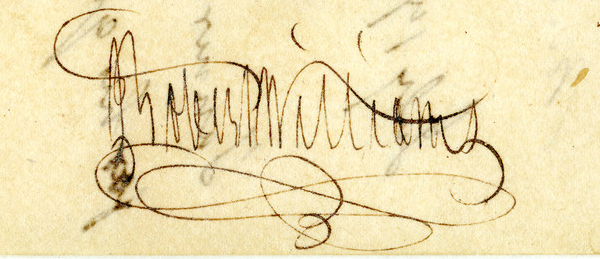ca. 1770–25 Jan. 1836
See also: Williams, Lewis; Williams, Marmaduke

Robert Williams, congressman and territorial governor of Mississippi, was born in Orange County (the present Rockingham County), the son of Nathaniel and Mary Ann Williamson Williams. His father (1741–1805), a native of Hanover County, Va., settled in the area that is now Rockingham County before 1770; he represented Guilford County in the Provincial Congress at Hillsborough in 1775 and was the first state attorney for the newly formed Rockingham County in 1786. Robert Williams was the brother of Congressman Marmaduke Williams (1803–9) and the first cousin of Congressman Lewis Williams (1815–42) and U.S. Senator John Williams of Tennessee (1815–23).
Robert Williams was reared in Rockingham County, where, after reading law, he was admitted to the bar. He purchased several tracts of land in the eastern section of the county, ultimately amassing nearly 5,000 acres. His home was a 2,000-acre plantation on the Dan River; in 1800, he was recorded as the enslaver of twenty-one people at this property. In 1799 he secured a lot and house in the county seat, Wentworth, and resided there at least during court sessions. He married after 2 Oct. 1790 Elizabeth Winston (1772–1814), the daughter of Major Joseph and Elizabeth Lanier Winston of Stokes County.
A lifelong Jeffersonian Republican, Williams served in the state senate from 1792 to 1795 and in Congress from 1797 to 1803. On Capitol Hill he was an outspoken opponent of the Federalists. During the Quasi-War with France he was critical of administration policy and opposed all military expenditures. An early and strong supporter of President Thomas Jefferson, Williams was named to the land claims commission for the territory west of the Pearl River in Mississippi. While on the commission he was appointed the third territorial governor of Mississippi; he served from 10 May 1805 until his resignation on 3 Mar. 1809. During this period there was considerable political unrest in the territory, and twice the governor dissolved the legislature. Much of the opposition to Williams was fomented by the territorial secretary, Cato West, who had sought the gubernatorial appointment. A major issue during Williams's administration was the unresolved border with Spanish territory. This led to numerous intrigues and disturbances involving local citizens, the Creek Indians, General James Wilkinson, and Aaron Burr.
Several times as governor Williams traveled on business to North Carolina, where he still held property. Following his resignation he returned to North Carolina, and during the War of 1812 he was adjutant general of the state, the officer responsible for mobilizing the militia and overseeing the equipment and training of the state forces. From 1811 to 1813 he was grand master of Masons in North Carolina. At that time he retained a home in Washington, Miss., the old territorial capital, where his wife died on 25 July 1814. Williams later moved to Quachita, La. He died there and was buried on his plantation near Monroe, La.